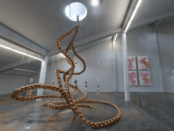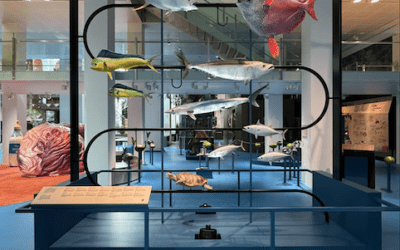Get involved.
Today is World Aids Day and in support Trebuchet would like people to get involved in the following events and if possible make a contribution to finding a solution.
World AIDS Day Official Site
Terrence Higgins Trust (The leading and largest HIV and sexual health charity in the UK)
On behalf of Little Annie and Southern Records:
Today, Wednesday 1 Dec, marks the twenty second annual World AIDS Day and I wanted to remind you of the video release for Billy Martin Requiem, one of the most powerful, sentimental and alluring album tracks on Little Annie and Paul Wallfisch’s Genderful. Annie has aptly chosen today to release the video in order to raise awareness of the virus.
While there is still no “cure” for or viable vaccine against HIV, the positive strides made battling the virus over the last few years are undeniable. New drugs are making what was a death sentence now a manageable – if serious and chronic – condition. Generic versions of these medications, along with ambitious public health policies are helping make real inroads against the disease in the developing world. There is space for much optimism this year. But what’s lost sometimes with the good news is a space to contemplate what has been lost to us – irrevocably. The talent unrealized, the creativity and vitality extinguished, the knowledge and experience that won’t be passed on to new generations – this was and continues to be the fall out from the AIDS epidemic.
Which brings us to Little Annie and her song/video “Billy Martin Requiem”. This astonishing track – from Genderful, her collaboration with Paul Wallfisch (Southern Records) – is perhaps the most New York centered selection on this most NYCentric collection. It is a song that Annie says she has been trying to write for years. For how does one address the catastrophe of AIDS without falling prey to either to platitudes and cheap sentiment or to the black void of grief? If you’re Annie you do so with humor, compassion and most knowing sadness. She did, after all, see it all back in the day. She cut her teeth on the downtown music/art scene – back in the bad, old days of the late 1970’s when the Big Apple was a bankrupt, crime-ridden, graffiti-tagged Hell. (Unless of course you were an artist, a free spirit, a thinker and/or a gay man – in which case that Hell was Heaven.) And she was in the trenches of what she calls “the war”, and watched as – to paraphrase Allen Ginsberg – the best minds of a generation disappeared.
Over a sexy, loping groove Annie sets herself adrift on her own stream of consciousness – her mind flowing back to the day. Back to her youth in Yonkers – just north of The Bronx, back to Yankee Stadium – which her train would pass as she headed south and then back to Billy Martin, the Yankees’ ill-starred manager who would die in a drunk driving accident. “No they don’t make ‘em like Billy anymore”, sings Annie. From there she neatly segues to the male disco diva Sylvester, whose “high pitched call to glamour” was the soundtrack to her youth, to gay men God lead her to and so many of whom would be lost to AIDS. “And though it hurts like hell to say it, he was only one of millions. They don’t make them like Sylvester anymore” says Annie before launching in a role call of great artists lost to HIV. The song is elegant and simple and gently devastatingDanny McKernan’s video for “Billy Martin Requiem” is likewise elegant, simple and powerful – hearkening back to the days when promo clips where about the happy collision of a great song, a charismatic performer and film maker with a vision, as opposed to the bloated/vacant visual intravaganzas our eyes/ears are more often than not subjected to these days.
Both the song and the video gently ask the audience to never forget what is missing from this world due to HIV, and to remember the brilliance that has passed from our midst.
The video can be viewed on the Southern Records You Tube channel and we strongly urge you to give a few minutes of your time to watch it.
I have enclosed a short interview with the director about the making of the video and the reasoning behind the concept. Annie is also more than happy to share her experiences and personal stories if you would like to interview her.
We appreciate any awareness you can raise to this video and ultimately the cause.
INTERVIEW WITH THE DIRECTOR DANIEL MCKERNAN
What made you want to work with Little Annie in general and on this video in particular?
Annie & I are dear friends and are both always working on our own projects & artworks. One day it dawned on us that we should collaborate– we felt almost silly not having done so already given how often we are in touch and that we live so close to each other. She’d sent me a few tracks on the album and I immediately gravitated towards “Billy Martin” not even having given thought to the subject matter. (To be honest, I didn’t know who Billy Martin was until I looked him up.) It made sense, though, that I was subconsciously drawn to this song.
What in particular was it about the song ‘Billy Martin Requiem’ that inspired you?
I have close friends living with the virus & had never had the inkling to make a video piece centered around the topic until this opportunity. In the late 90s I can remember not knowing anyone with HIV (to my knowledge) and I was chatting with a professor of mine who said he felt that people were too removed from the previous generation– the Sylvester generation– and that in light of that distance, they were being uncareful and there may be a backlash, a resurgence, of the virus oncoming… I found that a frightening thought & would like to raise awareness & consciousness to the seriousness of how devastating it was in the 80s. I was also around that time (late 90s) that l recall reading in the liner notes of Coil’s “Scatalogy” for their version of “Tainted Love” that at the time of that recording– 1981 I believe, the year that I was born– that only 1,011 cases of HIV had been reported in the UK. Slowly over the last ten years I’ve come to find out that several very close friends of mine are positive and although it is no longer a “death sentence” as it was back when there were no proper meds at the beginning of the virus, it still is an issue & the contraction of the virus is something that can be avoided.
When and how did you film it?
We filmed it in the summertime in New York City over the course of four days. We knew we wanted to film the majority of it at the Chelsea Piers since they have the history of the virus. They were once the stomping grounds for the gay/trans community (see ‘Paris is Burning’ or ‘Gay Sex in the 70s’ — both really great documentaries which largely feature the piers). Annie mentions the piers in the track as well. The ruins there now– those wooden stumps just peeking up over the water– bring to mind something like tombstones for the good times had there in yesteryears. Annie had the idea to style herself in a few different ‘drag’ looks. The weather on one of the days was somewhat ominous– appropriate given the subject matter– yet the rain stayed afar and we were able to film that closing scene where the colors of the sky turned out beautifully. For the choruses we filmed Annie putting on her makeup and then washing it off in Central Park– which has a feeling of a baptism, or cleansing. Lastly, the flickering images at the end of the video are all artists/actors/etc who have died of AIDS: it is an homage to them.
AND IN THE US…
LOWER EAST SIDE HARM REDUCTION CENTER
SMART UNIVERSITY
An educational/prevention program for women who are affected or infected
CARING HANDS FOR POSITIVE WOMAN
A not-for-profit community-based organization whose mission is to build a grassroots alliance of low-income women and their families residing in the East Harlem/El Barrio Community. Collaborating with the KIDS S.A.V.E.D 4 Life Program, the organization has been working with 28 schools in Manhattan teaching children how to help family and friends who are HIV positive. alilliboo@aol.com (Lillian Anglada)
PRIDE PUERTO RICAN INITIATIVE TO DEVELOP EMPOWERMENT www.prideny.org

The aim of art is to represent not the outward appearance of things, but their inward significance. – Aristotle

















